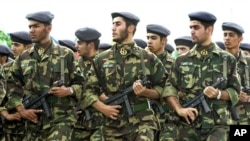The European Union on Wednesday expanded Syria sanctions to target the elite unit of Iran's Revolutionary Guard for its role in helping Syrian security forces crush the five-month-old uprising against President Bashar al-Assad.
An EU statement said Iran's elite Quds Force has provided "technical assistance, equipment and other support to the Syrian security forces to repress civilian protest movements."
Other new targets on the EU blacklist include several Syrian generals, a former defense minister and special envoy for President Assad, Hassan Turkmani, and close associates of the president's younger brother, Maher.
Meanwhile, Syria's state-run SANA news agency says "armed terrorist groups" have killed eight Syrian soldiers, including an army officer during a pair of attacks on military vehicles. The agency said the soldiers were killed Wednesday in towns near the central city of Homs.
Earlier Wednesday, Syrian security forces continued raiding towns and villages throughout the country and arrested suspected government opponents. Human rights groups said security forces used tanks in some of the raids, which began late Tuesday.
In Paris, French President Nicolas Sarkozy told a news conference Syrians "have the right to democracy." But he ruled out military intervention without an international mandate.
The United Nations says at least 2,200 people have died in Syria during the government's five-month crackdown on pro-democracy demonstrators. Assad has blamed much of the deadly violence on what he says are armed "gangs" and "terrorists."
The Reuters news agency quoted an Arab League official Wednesday as saying the grouping would hold an urgent meeting on Syria Saturday.
On Wednesday, the SANA news agency showed graphic photos of what it described as victims of an attack by "armed terrorist groups" in Homs. It said 14 citizens had been "kidnapped, tortured and killed" by the assailants.
On Tuesday, Western nations circulated a draft U.N. Security Council resolution calling for sanctions against Assad, influential family members and key associates.
U.S. and European delegations on the Security Council hope to put the resolution to a vote as soon as possible. They are, however, facing resistance from Russia, which has veto power. Moscow has said it does not think sanctioning Damascus is the right approach at the moment.
EU Broadens Syria Sanctions to Target Iran's Revolutionary Guard




